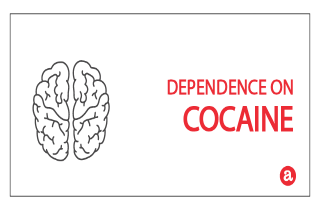Using cocaine can cause serious health problems and may lead to death, usually from cardiac arrest, stroke, or seizure. But how is cocaine dependence different from addiction? What symptoms are present to indicate dependence on cocaine and how can it be treated? More here, with a section for your questions about what cocaine withdrawal is like or how to treat cocaine at the end.
Cocaine dependence vs. addiction
Is there a difference between cocaine dependence and addiction? Yes. This distinction can be difficult to discern, particularly for highly addictive stimulant drugs like cocaine. Addiction — or compulsive cocaine use despite harmful consequences – is defined principally as a set of psychological symptoms:
- loss of control of drug use (frequency, amount, or an inability to stop using a drug)
- continued drug use despite negative life consequences
- cravings for the drug
- obsessive or compulsive thinking about the drug
Physical dependence, however, is specifically physical in nature. During dependence, the body adapts to the drug, eliciting drug-specific physical or mental symptoms if drug use is abruptly ceased (withdrawal). Physical dependence in and of itself does not constitute addiction, but it often accompanies addiction.
Cocaine dependence time: How long to be dependent on cocaine?
In order to sustain their high, people who use cocaine often use the drug in a binge pattern. Binge use of cocaine is defined as taking the drug repeatedly within a relatively short period of time. This practice can lead to drug dependence within a period of days. However, once a person recovers from withdrawal symptoms triggered by cocaine dependence, the psychological symptom of cravings specific to addiction can compel continued use of cocaine.
At a certain point, cocaine usage ceases to be a voluntary action for people who take cocaine regularly. Tolerance develops in many addicts, wherein a larger dosage is needed to attain the same high that a user initially experienced. However, sensitization may develop instead, wherein a user becomes more responsive to cocaine without increasing the dose.
Dependence on cocaine symptoms
With repeated exposure to cocaine, the brain starts to adapt to its presence, and the dopamine-based reward pathway that registers pleasure in the system becomes numb to BOTH natural reinforcers and to the drug itself. Tolerance may develop during this time, meaning that higher doses and/or more frequent use of cocaine is needed to achieve the same level of pleasure experienced during initial use. At the same time, users can also become more sensitive to cocaine’s toxic effects.
Primary symptoms of cocaine dependence may include:
- agitation and restless behavior
- depressed mood
- fatigue
- generalized malaise
- increased appetite
- vivid and unpleasant dreams
- slowing of activity
During withdrawal, there can be powerful, intense cravings for cocaine. The craving and depression associated with cocaine withdrawal can last for months following cessation of long-term heavy use (particularly daily). Withdrawal symptoms may also be associated with suicidal thoughts in some people. Consider also that while not caused by dependence on cocaine, increased tolerance to cocaine can develop after regular use.
Physical dependence on cocaine
Cocaine produces a sense of extreme joy by causing the brain to release higher than normal amounts of some biochemicals. However, cocaine’s effects on other parts of the body can be very serious or even deadly.In fact, there are significant physical risks associated with using any amount of cocaine and crack.
For example, cocaine and crack addicts often become unable to function sexually. Even first time users may experience seizures or heart attacks, which can be fatal. Some of the physical risks of using cocaine include:
- brain seizures
- heart attacks, strokes, and respiratory failure
- hepatitis or AIDS through shared needles
- increases in blood pressure, heart rate, breathing rate, and body temperature
- reduction of the body’s ability to resist and combat infection
Psychological dependence on cocaine
Psychological risks of dependence on cocaine include:
- anxiety
- confusion
- depression
- hallucinations (especially a sensation of imaginary insects crawling over the skin)
- losing touch with reality
- loss of interest in food or sex
- loss of interest in friends, family, sports, hobbies and other activities
- violent, erratic, or paranoid behavior
Some users spend hundreds or thousands of dollars on cocaine and crack each week and will do anything to support their habit. Many turn to drug selling, prostitution, or other crimes. Cocaine and crack use has been a contributing factor in a number of drowning, car crashes, falls, burns, and suicides.
Cocaine dependence withdrawal
Cocaine withdrawal occurs when a heavy cocaine user cuts down or quits taking the drug. Complete abstinence and a serum drug levels of zero are not required for the onset of withdrawal. When cocaine use is stopped or when a binge ends, a crash follows almost immediately. This crash is accompanied by a strong craving for more cocaine.
Cocaine withdrawal often has no visible physical symptoms like the vomiting and shaking that accompanies the withdrawal from heroin or alcohol. Instead, the level of craving, irritability, delayed depression, and other symptoms produced by cocaine withdrawal rivals or exceeds that felt during other withdrawal syndromes. Cocaine dependence withdrawal triggers symptoms such as:
- agitation
- anxiety
- extreme cravings
- extreme suspicion or paranoia
- fatigue
- irritability
- lack of pleasure
- sleepiness
Cocaine dependence questions
Still have questions about cocaine dependence or need help for a cocaine addict? Please leave your questions in the comments section below. We do our best to respond to you personally and promptly.









Related Posts